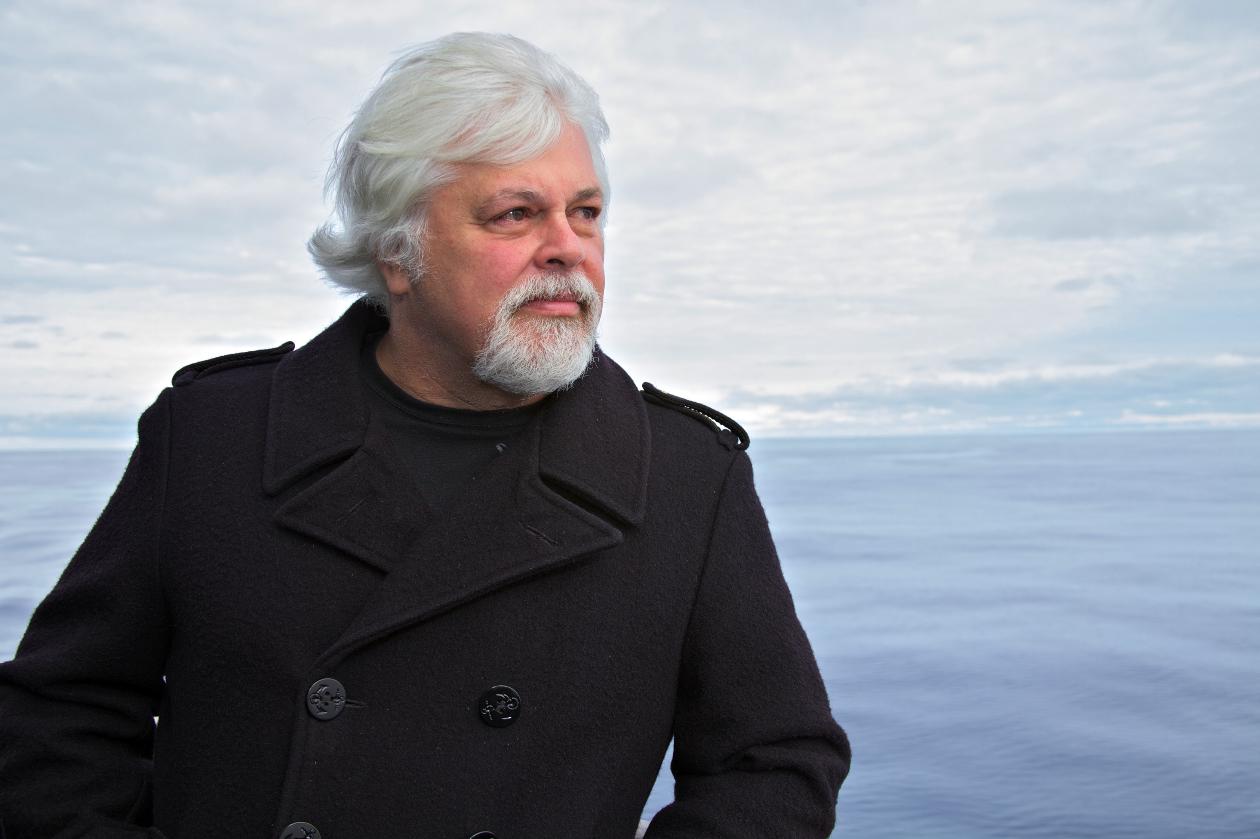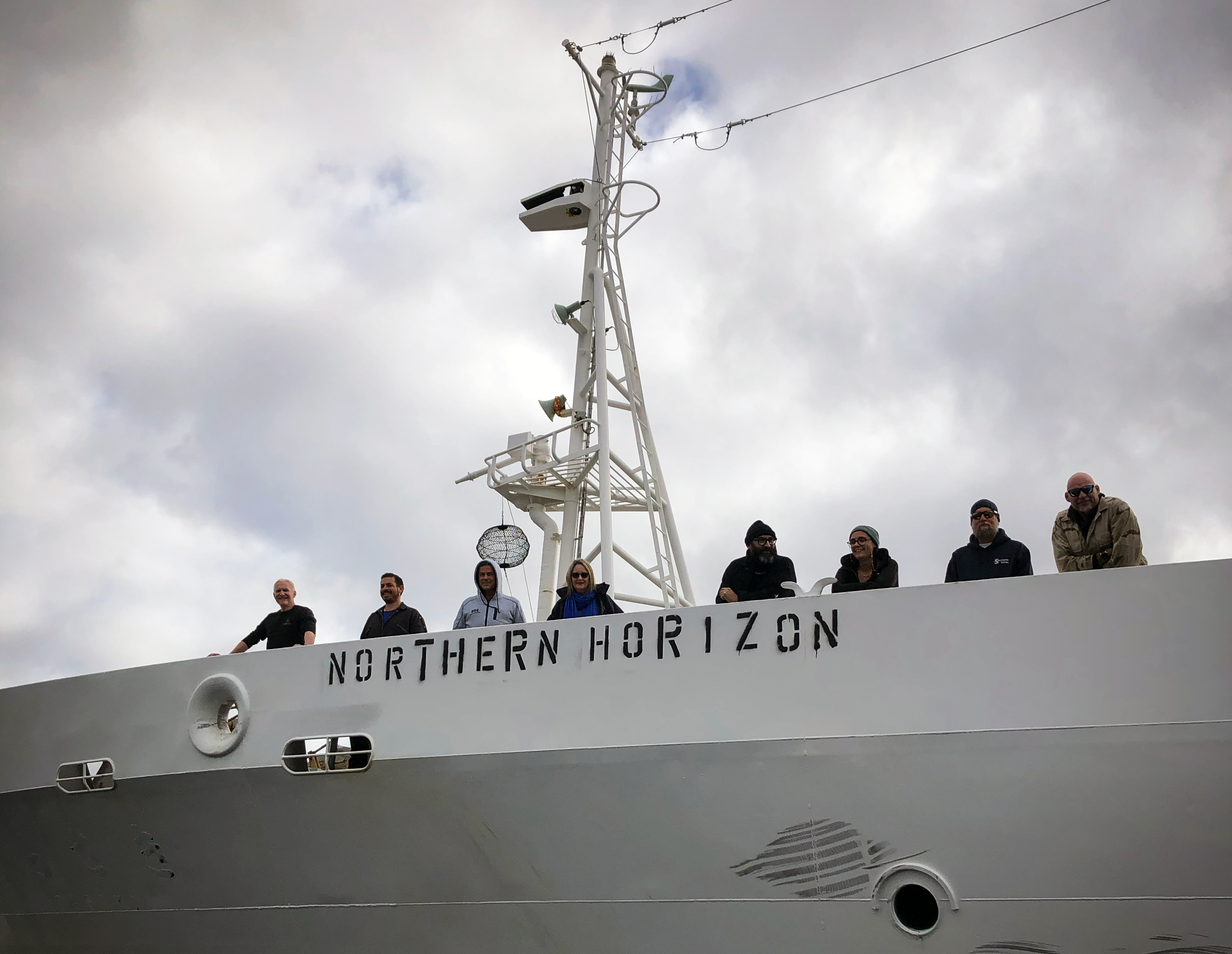Paul Watson Returns To Hobart En route to antarctica to protect whales as japan launches new 'mother ship sized whaler' - pittwater's jools farrell on board

Ocean conservation organisation Captain Paul Watson Foundation, which sails under the banner of Neptune’s Pirates has just acquired a new vessel, The Bandero, a former Japanese Fisheries Patrol ship, to combat illegal whaling in the Southern Ocean Whale Sanctuary. The vessel, which has just sailed from Busan, Korea, docked in Hobart, Tasmania on Wednesday May 1st.
Japan ended its Antarctic whaling program in 2018 after the relentless pursuit by Watson’s ships and later, a ruling by the International Court of Justice concluding Japan’s whaling program in the Antarctic (JARPA II) was in breach of obligations assumed by Japan under the International Convention for the Regulation of Whaling (‘ICRW’). Despite this, Japanese whaling company Kyodo Senpaku, recently launched a newly built $50 million dollar whale processing factory ship, the Kangei Maru, in Shimonoseki, which has been designed with the ability to travel as far as Antarctica to hunt whales.
Coordinator at Sydney/NSW of the Captain Paul Watson Foundation and Pittwater whale champion Jools Farrell is aboard.
“If Japan decides to return to the Southern Ocean Whale Sanctuary, the Captain Paul Watson Foundation will target illegal whaling activities in Australia’s Antarctic Territory,” said Omar Todd, CEO at The Captain Paul Watson Foundation.
Captain Paul Watson is known for his fight against whaling in the Southern Ocean Sanctuary and his actions have saved the lives of thousands of whales throughout the years. Under the new foundation bearing his name, he is joined by volunteers and activists from around the Globe in the effort to protect whales and the delicate balance of life in Antarctic waters.
“The previous organizations I founded have moved to the mainstream, but my team and I remain loyal to our cause and continue with the same course of action, utilising our proven strategies of aggressive non-violence,” stated Captain Paul Watson
The Bandero, sailing on a single permit voyage to Australia as the Northern Horizon, under a Mongolian Flag, was recently purchased covertly by Watson’s Foundation from the Japanese government.
“Months of preparation went into acquiring a suitable vessel to restart Southern Ocean campaigns. Though this vessel will be used to curtail whaling in Antarctic waters, there is no denying Japan builds some of the best quality vessels, in fact this ship is tailor-made for what we do” said Captain Locky MacLean, who has helped acquire 10 ships for Captain Watson over the two decades he has sailed with him, including the former Japanese Oceanographic Research vessel Seifu Maru in 2012, which was also unveiled in Hobart and named Sam Simon, after the Producer of the Simpsons television show, who donated funds toward the vessel’s acquisition.
The Bandero, named after the Tequila brand of American Billionaire, John Paul DeJoria, Founder of Patron Tequila and John Paul Mitchell hair care products, is a 64-meter ship with a gross tonnage of 499 tons, and will be stationed in Hobart, Tasmania in the coming weeks while undergoing reflagging and survey work. Skipper Mark Gibbs, who sailed the ship down from Korea in 17 days, stated
“Its a big ocean out there, and thanks to benefactors like John Paul DeJoria, we’ll be able to do our bit, protecting marine wildlife”. Gibbs, a marine scientist from Queensland, works with coral reef restoration when not on the high seas helping out at the Paul Watson Foundation.

The Bandero

Crew aboard the Bandero, including Pittwater's Jools Farrell (lady in blue)
In 2022, Mr. DeJoria also donated funds for the purchase of a former Scottish Fisheries Patrol vessel now named the John Paul DeJoria. The activists will be taking the ship to Iceland this summer to oppose the illegal hunting of endangered Fin whales. The John Paul DeJoria will then reposition to Australia to join the Bandero at the end of year for the campaign to defend whales in the Southern Ocean.
“The Captain Paul Watson Foundation was established in September 2022, but the passion, courage, and imagination that built our reputation continues with a new name, new ships, and the original objectives and strategies developed by Captain Paul Watson over decades of non-violent direct action,” stated Haans Siver, Australian Director of CPWF based in the Sunshine Coast.
At present Northern Horizon remains in the Derwent River pending a review by Tasports of their berthing fee at Princes Wharf in Hobart for clearance, and a safety assessment allowing the vessel to proceed to its berth at Prince of Wales Bay Marina.
Bob Brown, the chair of Sea Shepherd Australia during the ‘whale wars’ in which Captain Paul Watson’s ships confronted the whalers and won the day, has pointing out to the Tasmanian Ports Corporation as being responsible for saddling the ship with the same high costs as if it was a commercial, trading vessel.
“TasPorts’ failure to accept that the Captain Paul Watson Foundation’s ship is a non-profit conservation vessel solely aimed to defend the oceans and Antarctica has effectively forced a decision for it to be refitted in Brisbane. The prohibitive and unfair costs Tasports are demanding means the ‘Northern Horizon’ may leave in a few days for Brisbane where necessary preparations for its Antarctic voyage will be much less expensive. Hobart will lose all that business due to TasPorts’ inflexibility.”
“Tasmanians have always welcomed Captain Paul Watson and Sea Shepherd here because of our huge regard for whales and for the conservation of Antarctica. So there is going to be a lot of angst that the Captain Paul Watson Foundation’s new ship will be forced to go north to Brisbane to fit-out for its work in Antarctic waters. TasPorts is a government-owned corporation and I appeal to Premier Rockcliff to have its treatment of the ship reviewed,” Brown said.
‘’This is not a commercial vessel. This is a conservation vessel and TasPorts needs to wake up. I’ve written to the Premier this morning asking him – because TasPorts is a government corporation – to look at this and urgently review that decision to charge nearly $1,200 a day just for being here in Hobart. ''
Jools confrmed as this Issue went to press, Sunday May 5, TasPorts had not shifted from its decision.
Mr Maclean said the ship had a better range than previous foundation vessels and would be able to stay in Antarctica for an entire season.
As stated above, the Southern Ocean is a designated whale sanctuary, meaning all commercial whaling is banned.
The Japanese embassy, which had been contacted for comment, told The Australian newspaper the country had no plans to take whales from the Southern Ocean.
In May, the Kangei Maru, crewed by 100 crew, will leave its home port Shimonoseki to begin an eight-month expedition off the north-east coast of Japan. This will be the maiden voyage of Japan’s first new ship of its kind for more than 70 years.
In 2023 Japanese whalers caught 83 minke, 187 Bryde’s and 25 sei whales in Japan’s exclusive economic zone, however an appetite for whale meat in Japan is at an historic low, appealing mostly to the older Japanese people.
The International Whaling Commission (IWC) banned commercial hunts in 1986 but allowed Japan to continue catching a small number of whales in the Antarctic each year for “research” purposes.
In 2014, the international court of justice ordered a halt to the expeditions after concluding the hunts were not, as Japan had claimed, conducted for scientific research, and which, in May 2018, saw 122 pregnant female whales killed as part of Japan’s so-called ‘scientific’ whaling program, and a September 2018 report coming in that Japanese whalers had killed more than 50 minke whales in the Ross Sea Marine Protected Area (MPA) in Antarctica, as revealed by WWF on the opening day of the International Whaling Commission (IWC) meeting in Brazil.A’.
Japan pulled out of the IWC and announced it would end the Antarctic hunts, but resumed commercial whaling in its coastal waters.
Despite leaving the IWC, Japan has “not given up” on the resumption of whale hunting in the Antarctic, according to Ren Yabuki, director of the Japanese environmental and animal protection group Life Investigation Agency.
The ship’s owner, Kyodo Senpaku, has dismissed the claim. “We left the IWC and so at this point in time it is not under consideration,” said a spokesperson, “The government has not indicated that Southern Ocean whaling is in its plans, and our mission is to use the new ship to conduct commercial coastal whaling for at least the next 30 years.”
ABOUT THE CAPTAIN PAUL WATSON FOUNDATION:
The Captain Paul Foundation, founded in 2022 by esteemed environmental and conservation activist Paul Watson, co-founder of Greenpeace and founder of Sea Shepherd, alongside tech entrepreneur Omar Todd, is a US-based non-profit dedicated to marine conservation. Committed to halting habitat destruction and wildlife slaughter in the world’s oceans, the foundation aims to safeguard marine ecosystems and species. It uses innovative direct-action tactics to expose and confront illegal activities at sea.
Visit www.paulwatsonfoundation.org for more information.
Images Credit: CPWF